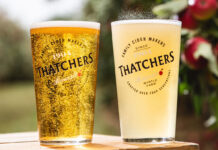Maintaining draught quality might be more important now than ever

THE more things change, the more they stay the same, so the expression goes.
And even as the licensed trade has to contend with a raft of new rules and regulations there are some things – such as the importance of clean lines and a well-maintained beer cellar – that remain unchanged.
In fact, cellar specialists argued that keeping cellar standards up might be even more important during the pandemic.
Jerry Shedden of Heineken UK said that, as operators “navigate the current climate, now is the time to consider making changes to develop your business and enhance the customer experience”.
Richard Cooper of line cleaning specialist Clear Brew agreed.
He said that it is “critical” that beer quality standards are maintained even when staff numbers might be lower.
“During difficult periods this should be emphasised, as it’s easy to forgo your good practice when things are busy and much harder to deal with once things have gone downhill,” said Cooper.
“You should remember that, for customers, going to the pub is not as simple and casual as it used to be and being served sub-standard beer or getting bad service whilst you deal with a crisis is just going to send them elsewhere.
“At times like these every customer counts.”
It’s not just staff numbers that are likely to be lower under current trading conditions.
With operators required to incorporate social distancing into their venues, footfall is likely to be lower as well.
For this reason Cooper said it is worth considering reducing the number of draught lines in use at any time.
“There’s no point in keeping everything in service if half the lines are lying unused,” he said.
Cooper recommended the use of a liquid beer line protector to keep unused lines in good condition until they are needed again.
“Good stock management will allow licensees to stay on top of demand (or lack of), and as with anything it’s best to be proactive about these things,” said Cooper.
“If unused lines are kept in good order, it is a matter of minutes to bring them back online.”
This was reinforced by Alistair Dowds of dispense specialist Brewfitt, who said licensees should get “back to basics” with regard to their draught range.
“By that I mean people should consider their draught offering,” said Dowds.
“Consider the number of products on sale; it is always better to have a small number of tap lines selling through within a few days rather than offering your customers a large selection of beverages that are slower sellers.
“Also, do you really need multiple lines of the same product?”
And Dowds pointed out that fewer operational lines also means fewer lines to clean every week – something that could be particularly helpful for venues operating with fewer staff than normal.
But cost-cutting isn’t just something that is beneficial to operators during a pandemic, and Steve Comerford of cellar equipment supplier BeerTech said there are a number of ways bar and pub operators can reduce costs while maintaining standards.
“The main source of energy usage in a cellar is the chiller system,” said Comerford.
“A standard size system is in the region of 4KW.
“This is separated into two parts: the evaporator in the cellar and the condenser outside.
“The condenser is switched on and off as required by the evaporator’s thermostat to maintain the cellar temperature at the required 12 degrees for the storage of the beer.
“If the condenser is in operation for an average of 50% over the whole year, the cost of electricity to run the system will be in the region of £2500.
“A simple after market timing device can operate the condenser to switch off and on according to temperature readings, and can reduce this cost by around £1000 per annum, whilst still maintaining the beer in the keg and cask at the correct storage temperature. The idea is simply to identify ‘leaks’ in costs and make efforts to reduce them.”
Comerford added that, in addition to saving more in electricity than the unit costs to buy, these devices will also help to save around two tonnes of CO2 per unit every year.
























